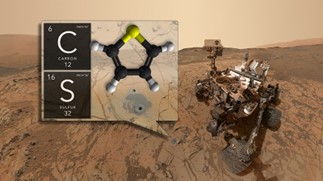PREVIOUS
Organic matter on Mars
July 27 , 2023
639 days
517
0
- NASA’s Perseverance rover has discovered evidence of organic compounds in a Martian crater.
- This providing insights into the potential habitability of Mars.
- It reveals a more complex organic geochemical cycle on Mars than previously thought.
- It is also indicating the presence of multiple reservoirs of the potential organic molecules on the planet.
- The findings suggest that Mars has experienced aqueous processes and that water may have played a significant role in the existence of organic matter.
- The research team used an instrument called the Scanning Habitable Environments with Raman and Luminescence for Organics and Chemicals (SHERLOC) to detect the organic compounds.

Leave a Reply
Your Comment is awaiting moderation.


